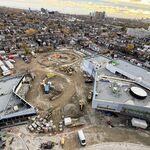Four: Property taxes do not grow with the economy
If income levels in Canada rise, the federal government will collect more income tax (all other things being equal). But if the total value of property in Toronto goes up, the municipal government doesn’t collect more in property tax. Again, that’s because the City starts with a total dollar amount it needs to raise, rather than with a taxation rate. Property tax isn’t a function of any economic activity—it’s manually set by the City, so to speak—and so it doesn’t grow even if property values do. And since property assessment changes are revenue neutral, the only way to increase revenue is to increase the property tax rate.
The City needs to raise more money each year because while its property tax revenue is fixed, its expenses are not. Inflation and contracted wage increases mean that the City’s annual spending will go up automatically, thereby outstripping revenue (even if it institutes no new services or programs).
Let’s say the City needs $1 billion in residential property tax revenue one year, and the average property tax bill is $1,000. The following year inflation is projected to be two per cent, which means that in order to purchase precisely the same goods and services (and not accounting for wage increases), the City needs to raise $1.02 billion. That would mean the average property tax bill goes up to $1,020.
This is generally described as a two per cent property tax hike, and causes some politicians to get very shout-y. That’s a confused description, though—sort of like you misinterpreting a cost-of-living increase in your salary as an actual raise. The number of dollars you bring home goes up, but your relative place in the economy, your salary’s purchasing power, has stayed exactly the same.
http://torontoist.com/2015/12/how-property-taxes-work/
This also gives you an idea:
https://www1.toronto.ca/wps/portal/...nnel=e52b285441f71410VgnVCM10000071d60f89RCRD
AoD





